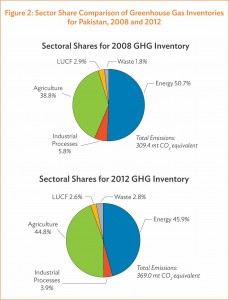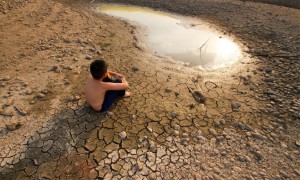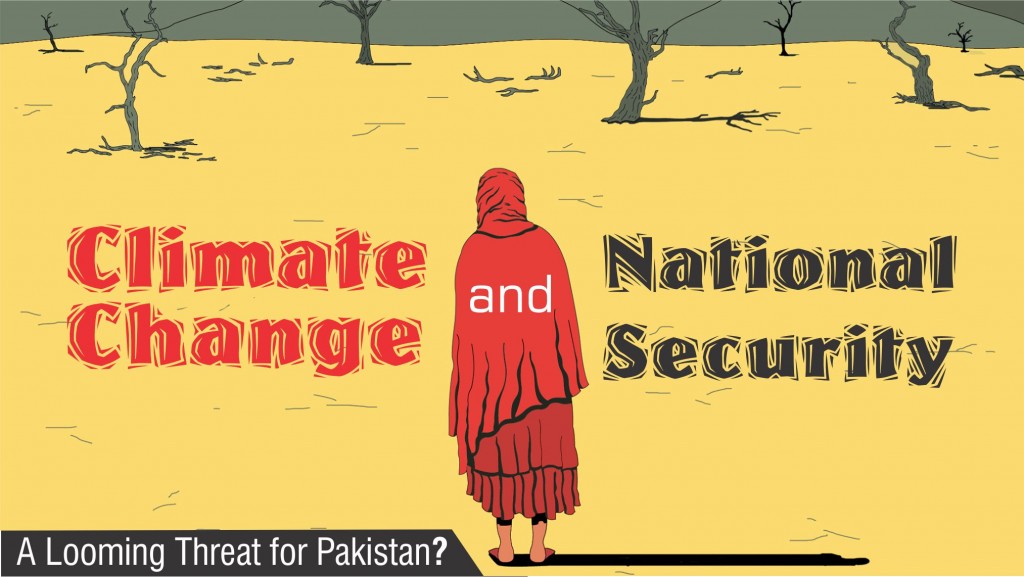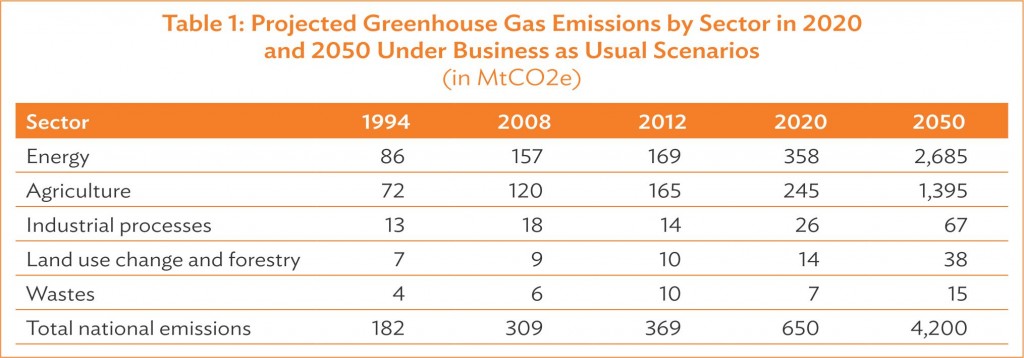Climate Change and National Security
A Looming Threat for Pakistan?
Mehtab Ali Bhatti
With far-reaching consequences like food scarcity, climate change is a major security challenge and countries like Pakistan. It is indeed a threat multiplier, exacerbating existing pressures as well as presenting new challenges to our national security. With Pakistan ranked seventh in the list of countries who are at risk from climate change, some lawmakers have called for declaring climate change a ‘national security issue’ for its devastating effects.
Introduction
Climate change is a hot issue nowadays as it drastically impacts the world at various scales. Basically, climate change is an erratic change in weather patterns, oceans and topography due to sun’s radiation, volcanoes, tsunamis and manmade appliances. However, it is a lesser acknowledged fact that climate change impacts the security of the world; hence national security of states. It may threaten public welfare, political and economic stability, technology, ecosystem and social system of a country as it engenders issues like political instability, poverty, environment deterioration and social problems. According to former US President, Barack H. Obama, “Climate change is no longer some far-off problem; it is happening here, it is happening now.”
In case of Pakistan, if climate change is not adequately addressed, there would be ample chances of security implications. According to Climate Risk Index (CRI) report of 2016, Pakistan is the 7th most vulnerable country to the climate change and global warming. From 1997 to 2016, the country experienced 141 disastrous weather events, i.e. floods, storms, cyclones, heat waves and many others — two major catastrophic events were 2005 earthquake and 2010 super floods which displaced thousands of families and damaged properties worth billions. Moreover, due to climate change, Pakistan will have to face far-reaching repercussions, e.g. food shortage, water scarcity, less agricultural production, dwindling economy, humanitarian crises, increasing unemployment, health issues, natural disasters, ecosystem deterioration, political instability and increase in mass migration.
Implications of Climate Change on Pakistan
Climatic change is not merely a sectoral issue; it is a multi-dimensional one. Pakistan is facing various critical issues in social, economic, political and geographical domains and these are affecting the country’s national security. Thus, the situation warrants prudent policymaking and its complete execution in all sectors so as to curb the rising issue of climate change and global warming. Here are some of the implications that Pakistan may have in various sectors:
Economy
- Deteriorating agriculture sector
“Erratic weather patterns and climate change have emerged as the biggest environmental challenges that are affecting almost all the sectors of economy particularly water resources, energy, health, biodiversity with a major impact on agricultural productivity. In economic sector, climate change presents dire threat for Pakistan due to the imminent water scarcity and less production of agriculture. Climate change also poses a serious challenge to Pakistan’s agriculture and threatens country’s water availability and food security. Pakistan’s majority of population is dependent on agriculture and this sector is also a major forex-earner. In addition, any volumetric damage to this sector would be challenge for Pakistan’s economy and trade balance, which, in turn, would be detrimental to national economy.
Approximately 67% of Pakistanis are involved in agriculture sector. More than 50% of the country’s land is affected due to erratic climate patterns. In 1949, agriculture was the supreme sector of Pakistan’s economy as it was responsible for 53% of the GDP. In 1980, the share decreased to 31% and it accounts for only 21% of the GDP. Some research reports have blamed climate change as the major reason behind this situation.
- Less public sector spending
Economy is the most important pillar of a country’s development and stability, but climate change has ever been in negative relationship with economy. In case of Pakistan, this phenomenon has impacted almost all sectors of economy. According to noted American economist William Nordhaus, a poor country like Pakistan that has low GDP per capita means dearth of absolute taxation which leads to bad governance and increase in budget deficit. Furthermore, low taxation leads to less spending on public facilities like education system, law and order, healthcare and so on.
Social
- Increasing unemployment and impact on youth
Climate change has exacerbated problems in the social sector by posing a potent threat to economic sectors by creating economic degradation. Agriculture has been hit hard by climatic changes, thus creating a crisis of unemployment during the recent years. Currently, a large number of Pakistani youths are unemployed just because of fragile economy and one major reason behind this is climate change. This situation has given rise to crimes. Moreover, most unemployed and jobless youth have been vulnerable to mental illness and health problems like depression.
- Health issues
Erratic climate change and global warming have led to spread of diseases. Water and air-borne diseases are result of warm climate patterns, and seriously vulnerable to these diseases are the poor. Lower agricultural production is triggering health issues which affect the food security – that’s why 45% of Pakistan’s rural and 36% of urban children are experiencing malnutrition; particularly children in Thar (Sindh) are suffering from malnutrition and drought.
Geographical
- Disasters and varying topography
Climate change has also the geographical implications which directly hit the national security of Pakistan. The country’s total coastline is 1045 kilometres. Owing to a rise in sea level, the lives of people living in coastal areas are in danger. According to a 2010 report by Intergovernmental Panel on Climate Change (IPCC), by 2100 sea level will rise by 59 centimeters which is a huge threat for Pakistan—it may submerge the coastal line of Pakistan.
- Detrimental to ecosystem
Climate change has denuded the current ecosystem of Pakistan and has also endangered its biodiversity. The rising water acidity levels have been caused by high emissions of carbon dioxide, which has also threatened the coral reefs of sea coastline near Thatta, Sijawal and Karachi to Gwadar. Besides, climate change has affected Thal and Thar deserts leading to increased droughts. Categorically, if possible measures and remedies not taken then it will lead to cryptic imbalance and will further disturb the lives of coastal line natives.
Recommendations
Climate change has raised serious concerns for Pakistan’s national security and in future it may become a daunting challenge, if mitigation policies are not adapted now. Though it is very clear that 21st century has presented a lot of technologies and scientific standards which helped human to counter and minimize climate change effects, Pakistan’s ambivalent eye on resources is the major issue.
Firstly, water scarcity is a huge problem. The state should publicize the issue and penalize those who use it injudiciously or steal it. Water reservoirs are the need of hour as they will assume critical importance in the near future.
Secondly, lack of research in agriculture domain is another huge problem. For improvement, we need to re-innovate technological equipment for better weather prediction, and communication with farmers or landowners must be made in case of erratic weather patterns.
Thirdly, unless the masses are aware of emerging issues of climate change, all attempts to curb this phenomenon may end up in smoke. Government should publicize some projects of awareness through print or social media.
Lastly, climate change challenge is the not only for Pakistan, India or Bangladesh but for the whole world, so Pakistan should augment its cooperation with international community, and get technical and financial help to tackle emerging non-traditional issues.
Conclusion
It is time we jettisoned our military-centric view of the national security and started paying more attention to the real threats that imperil our national security in the shape of environmental destruction and natural calamities. It is time India and Pakistan buried the resource-guzzling hatchet of the nuclear and conventional arms race and took the raging bull of climate threat by its horns. The time has come for a Track-II initiative between both countries for joint water resource conservation, watershed management, and environment control.
 Jahangir's World Times First Comprehensive Magazine for students/teachers of competitive exams and general readers as well.
Jahangir's World Times First Comprehensive Magazine for students/teachers of competitive exams and general readers as well.





